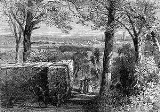
History of Augusta, Georgia
Encyclopedia
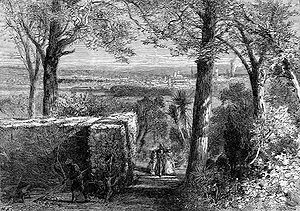
Augusta, Georgia
Augusta is a consolidated city in the U.S. state of Georgia, located along the Savannah River. As of the 2010 census, the Augusta–Richmond County population was 195,844 not counting the unconsolidated cities of Hephzibah and Blythe.Augusta is the principal city of the Augusta-Richmond County...
was founded in 1735 as part of the British colony of Georgia
Province of Georgia
The Province of Georgia was one of the Southern colonies in British America. It was the last of the thirteen original colonies established by Great Britain in what later became the United States...
, under the supervision of colony founder James Oglethorpe
James Oglethorpe
James Edward Oglethorpe was a British general, member of Parliament, philanthropist, and founder of the colony of Georgia...
. It was the colony's second established town, after Savannah
Savannah, Georgia
Savannah is the largest city and the county seat of Chatham County, in the U.S. state of Georgia. Established in 1733, the city of Savannah was the colonial capital of the Province of Georgia and later the first state capital of Georgia. Today Savannah is an industrial center and an important...
. Today, Augusta is the second-largest city in Georgia
Georgia (U.S. state)
Georgia is a state located in the southeastern United States. It was established in 1732, the last of the original Thirteen Colonies. The state is named after King George II of Great Britain. Georgia was the fourth state to ratify the United States Constitution, on January 2, 1788...
, and the largest city of the Central Savannah River Area
Central Savannah River Area
The Central Savannah River Area is a 13-county region in the U.S. state of Georgia, and is also considered to include five to eight counties in South Carolina. The term was coined in 1950 by C.C. McCollum, the winner of a $250 contest held by The Augusta Chronicle to generate the best name for the...
.
Colonial Augusta
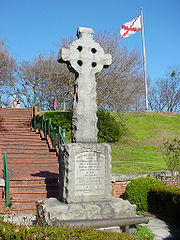
Augusta, Georgia
Augusta is a consolidated city in the U.S. state of Georgia, located along the Savannah River. As of the 2010 census, the Augusta–Richmond County population was 195,844 not counting the unconsolidated cities of Hephzibah and Blythe.Augusta is the principal city of the Augusta-Richmond County...
was first used by Native Americans
Native Americans in the United States
Native Americans in the United States are the indigenous peoples in North America within the boundaries of the present-day continental United States, parts of Alaska, and the island state of Hawaii. They are composed of numerous, distinct tribes, states, and ethnic groups, many of which survive as...
as a place to cross the Savannah River
Savannah River
The Savannah River is a major river in the southeastern United States, forming most of the border between the states of South Carolina and Georgia. Two tributaries of the Savannah, the Tugaloo River and the Chattooga River, form the northernmost part of the border...
, because of Augusta's location on the fall line
Fall line
A fall line is a geomorphologic unconformity between an upland region of relatively hard crystalline basement rock and a coastal plain of softer sedimentary rock. A fall line is typically prominent when crossed by a river, for there will often be rapids or waterfalls...
.
In 1736
, two years after James Oglethorpe
James Oglethorpe
James Edward Oglethorpe was a British general, member of Parliament, philanthropist, and founder of the colony of Georgia...
founded Savannah
Savannah, Georgia
Savannah is the largest city and the county seat of Chatham County, in the U.S. state of Georgia. Established in 1733, the city of Savannah was the colonial capital of the Province of Georgia and later the first state capital of Georgia. Today Savannah is an industrial center and an important...
, he sent a detachment of troops on a journey up the Savannah River. He gave them an order to build at the head of the navigable part of the river. The job fell into the hands of Noble Jones
Noble Jones
Noble Wimberly Jones was an American physician and statesman from Savannah, Georgia. A leading Georgia patriot in the American Revolution, he served as a delegate to the Continental Congress in 1781 and 1782....
, who created the settlement to provide a first line of defense
Defense (military)
Defense has several uses in the sphere of military application.Personal defense implies measures taken by individual soldiers in protecting themselves whether by use of protective materials such as armor, or field construction of trenches or a bunker, or by using weapons that prevent the enemy...
against the Spanish
Spain
Spain , officially the Kingdom of Spain languages]] under the European Charter for Regional or Minority Languages. In each of these, Spain's official name is as follows:;;;;;;), is a country and member state of the European Union located in southwestern Europe on the Iberian Peninsula...
and the French
France
The French Republic , The French Republic , The French Republic , (commonly known as France , is a unitary semi-presidential republic in Western Europe with several overseas territories and islands located on other continents and in the Indian, Pacific, and Atlantic oceans. Metropolitan France...
. Oglethorpe then named the town Augusta, in honor of Princess Augusta, wife of Frederick, Prince of Wales
Frederick, Prince of Wales
Frederick, Prince of Wales was a member of the House of Hanover and therefore of the Hanoverian and later British Royal Family, the eldest son of George II and father of George III, as well as the great-grandfather of Queen Victoria...
.
The town was laid out on the flat slopes of the Savannah River, just east of the sand hills that would come to be known as Summerville. The townspeople got along peacefully most of the time with the surrounding tribes of Creek and Cherokee
Cherokee
The Cherokee are a Native American people historically settled in the Southeastern United States . Linguistically, they are part of the Iroquoian language family...
Indians.
In 1739, construction began on a road to connect Augusta to Savannah. This made it possible for people to reach Augusta by horse, rather than by boat, and more people began to migrate inland to Augusta. Later, in 1750, Augusta's first church, Saint Paul's
St. Paul's Episcopal Church (Augusta, Georgia)
Saint Paul's Church is a historic Episcopal church located in downtown Augusta, Georgia, adjacent to Riverwalk Augusta.-History:The church was established in 1750 by the Church of England at the site of Fort Augusta. The church, located on the corner of 6th and Reynolds Street, is the oldest church...
, was built near Fort Augusta. It became the leader of the local parish
Parish
A parish is a territorial unit historically under the pastoral care and clerical jurisdiction of one parish priest, who might be assisted in his pastoral duties by a curate or curates - also priests but not the parish priest - from a more or less central parish church with its associated organization...
.
While slavery was originally banned in the colony by James Oglethorpe, it soon became an integral part of Georgia's history. Under Georgia's new constitution
Constitution
A constitution is a set of fundamental principles or established precedents according to which a state or other organization is governed. These rules together make up, i.e. constitute, what the entity is...
, a new political structure was laid out in 1777; Augusta's parish government was replaced by a county government, Richmond County
Richmond County, Georgia
Richmond County is a county located in the U.S. state of Georgia. It is one of the original counties of Georgia, created February 5, 1777. As of 2010, the population was 200,549. The 2007 Census Estimate showed a population of 199,486....
, named after the Duke of Richmond
Duke of Richmond
The title Duke of Richmond is named after Richmond and its surrounding district of Richmondshire, and has been created several times in the Peerage of England for members of the royal Tudor and Stuart families...
.
American Revolution to the Civil War
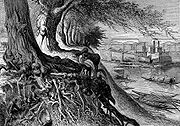
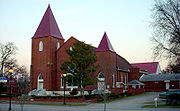
American Revolution
The American Revolution was the political upheaval during the last half of the 18th century in which thirteen colonies in North America joined together to break free from the British Empire, combining to become the United States of America...
, Savannah fell to the British
Kingdom of Great Britain
The former Kingdom of Great Britain, sometimes described as the 'United Kingdom of Great Britain', That the Two Kingdoms of Scotland and England, shall upon the 1st May next ensuing the date hereof, and forever after, be United into One Kingdom by the Name of GREAT BRITAIN. was a sovereign...
. This left Augusta as the new state capital and a new prime target of the British. By January 31, 1779, Augusta was captured by Lt. Col. Archibald Campbell. But Campbell soon withdrew, as American troops were gathering on the opposite shore of the Savannah River. Augusta again became the state capital, but not for long. Augusta fell into British hands once more before the end of the war.
From then until the American Civil War
American Civil War
The American Civil War was a civil war fought in the United States of America. In response to the election of Abraham Lincoln as President of the United States, 11 southern slave states declared their secession from the United States and formed the Confederate States of America ; the other 25...
, with the establishment of the Augusta Canal
Augusta Canal
The Augusta Canal is a historic canal located in Augusta, Georgia. The canal connects two points of the Savannah River. It was devised to harness the power of the fall line of the Savannah River for mills, to provide transportation of goods, and to provide drinking water for the city...
, Augusta became a leader in the production of textiles, gunpowder
Gunpowder
Gunpowder, also known since in the late 19th century as black powder, was the first chemical explosive and the only one known until the mid 1800s. It is a mixture of sulfur, charcoal, and potassium nitrate - with the sulfur and charcoal acting as fuels, while the saltpeter works as an oxidizer...
, and paper
Paper
Paper is a thin material mainly used for writing upon, printing upon, drawing or for packaging. It is produced by pressing together moist fibers, typically cellulose pulp derived from wood, rags or grasses, and drying them into flexible sheets....
. The Georgia Railroad was built by local contractors Fannin, Grant & Co in 1845, giving Augusta a rail link to Atlanta. The railroad connected to the Tennessee River
Tennessee River
The Tennessee River is the largest tributary of the Ohio River. It is approximately 652 miles long and is located in the southeastern United States in the Tennessee Valley. The river was once popularly known as the Cherokee River, among other names...
at Chattanooga, Tennessee
Chattanooga, Tennessee
Chattanooga is the fourth-largest city in the US state of Tennessee , with a population of 169,887. It is the seat of Hamilton County...
, thus providing access from inland Georgia to the Mississippi River
Mississippi River
The Mississippi River is the largest river system in North America. Flowing entirely in the United States, this river rises in western Minnesota and meanders slowly southwards for to the Mississippi River Delta at the Gulf of Mexico. With its many tributaries, the Mississippi's watershed drains...
. The cost-savings of this link from the middle of the country to the Atlantic Ocean
Atlantic Ocean
The Atlantic Ocean is the second-largest of the world's oceanic divisions. With a total area of about , it covers approximately 20% of the Earth's surface and about 26% of its water surface area...
via the Savannah River increased trade considerably.
In 1845, Augusta was the location of the founding of the Southern Baptist Convention
Southern Baptist Convention
The Southern Baptist Convention is a United States-based Christian denomination. It is the world's largest Baptist denomination and the largest Protestant body in the United States, with over 16 million members...
, today one of the largest Protestant denominations in the country. Due to increasing tensions between northern and southern Baptists on the subject of slavery in the 1840s, southern Baptists decided to withdraw formally from the national Baptist organizations. They met at the First Baptist Church of Augusta in May 1845 and formed the new convention, naming it the Southern Baptist Convention.
By 1860 Augusta had a population of 12,493; it was then one of 102 U.S. cities to have a population of over 10,000, and was the second largest city in Georgia.
Civil War to World War II
.jpg)
Confederate Powderworks
The Confederate Powderworks was a gunpowder factory during the American Civil War, the only permanent structures completed by the Confederate States of America. Colonel G.W...
were the only permanent structures constructed and completed by the Confederacy. Over 2000 Augustans went away to fight in the war, but war did not set into the minds of Augustans until the summer of 1863. It was in that year that thousands of refugee
Refugee
A refugee is a person who outside her country of origin or habitual residence because she has suffered persecution on account of race, religion, nationality, political opinion, or because she is a member of a persecuted 'social group'. Such a person may be referred to as an 'asylum seeker' until...
s from areas threatened by invasion came crowding into Augusta, leading to shortages in housing and provisions. Next came the threatening nearness of General Sherman's
William Tecumseh Sherman
William Tecumseh Sherman was an American soldier, businessman, educator and author. He served as a General in the Union Army during the American Civil War , for which he received recognition for his outstanding command of military strategy as well as criticism for the harshness of the "scorched...
advancing army, causing panic in the streets of the once-quiet town. However, the city was never burned to the ground. After the War, Augusta and Georgia were both under martial law
Martial law
Martial law is the imposition of military rule by military authorities over designated regions on an emergency basis— only temporary—when the civilian government or civilian authorities fail to function effectively , when there are extensive riots and protests, or when the disobedience of the law...
during the period known as Reconstruction. During this time, African American civil rights were expanded. Following the end of Reconstruction, the European American
European American
A European American is a citizen or resident of the United States who has origins in any of the original peoples of Europe...
majority population of Georgia and other Southern
Southern United States
The Southern United States—commonly referred to as the American South, Dixie, or simply the South—constitutes a large distinctive area in the southeastern and south-central United States...
U.S.
United States
The United States of America is a federal constitutional republic comprising fifty states and a federal district...
states enacted Jim Crow laws
Jim Crow laws
The Jim Crow laws were state and local laws in the United States enacted between 1876 and 1965. They mandated de jure racial segregation in all public facilities, with a supposedly "separate but equal" status for black Americans...
to limit the rights of African Americans. These restrictions would not be lifted until the Civil Rights movement of the mid-20th century.
In 1828, the Georgia General Assembly
Georgia General Assembly
The Georgia General Assembly is the state legislature of the U.S. state of Georgia. It is bicameral, being composed of the Georgia House of Representatives and the Georgia Senate....
granted a formal charter for the Medical Academy of Georgia, and the school began training physicians in two borrowed rooms of the City Hospital. By 1873, an affiliation was made with the University of Georgia
University of Georgia
The University of Georgia is a public research university located in Athens, Georgia, United States. Founded in 1785, it is the oldest and largest of the state's institutions of higher learning and is one of multiple schools to claim the title of the oldest public university in the United States...
, and the school became the Medical Department of the University. The school would become the Medical College of Georgia
Medical College of Georgia
Georgia Health Sciences University formerly known as, and now home of the, Medical College of Georgia , is a public academic health center, with its main campus located in the Medical District of Augusta, Georgia. It is the smallest of four research universities in the University System of Georgia...
in 1956. In 1914, University Hospital was founded near the Medical College, forming the anchor of a heavily developed medical sector in the city.
.jpg)
Cotton
Cotton is a soft, fluffy staple fiber that grows in a boll, or protective capsule, around the seeds of cotton plants of the genus Gossypium. The fiber is almost pure cellulose. The botanical purpose of cotton fiber is to aid in seed dispersal....
markets in the world. A new military cantonment
Cantonment
A cantonment is a temporary or semi-permanent military or police quarters. The word cantonment is derived from the French word canton meaning corner or district, as is the name of the Cantons of Switzerland. In South Asia, the term cantonment also describes permanent military stations...
, named Camp Hancock, opened nearby during World War I
World War I
World War I , which was predominantly called the World War or the Great War from its occurrence until 1939, and the First World War or World War I thereafter, was a major war centred in Europe that began on 28 July 1914 and lasted until 11 November 1918...
. In 1916 a large fire destroyed over 700 buildings in the city including many of its finest residences.
In 1927, Owen Robertson Cheatham founded the lumber company Georgia Pacific in Augusta, before it moved to Portland, Oregon
Portland, Oregon
Portland is a city located in the Pacific Northwest, near the confluence of the Willamette and Columbia rivers in the U.S. state of Oregon. As of the 2010 Census, it had a population of 583,776, making it the 29th most populous city in the United States...
, and later to Atlanta.
Prior to World War II
World War II
World War II, or the Second World War , was a global conflict lasting from 1939 to 1945, involving most of the world's nations—including all of the great powers—eventually forming two opposing military alliances: the Allies and the Axis...
, the U.S. Army constructed a new fort in Richmond County, Camp Gordon
Fort Gordon
Fort Gordon, formerly known as Camp Gordon, is a United States Army installation established in 1917. It is the current home of the United States Army Signal Corps and Signal Center and was once the home of "The Provost Marshal General School" . The fort is located in Richmond, Jefferson, McDuffie,...
, which was finished a few days after the attack on Pearl Harbor
Pearl Harbor
Pearl Harbor, known to Hawaiians as Puuloa, is a lagoon harbor on the island of Oahu, Hawaii, west of Honolulu. Much of the harbor and surrounding lands is a United States Navy deep-water naval base. It is also the headquarters of the U.S. Pacific Fleet...
. Many new soldiers were brought to this camp to train to go off to war. Within the few months after WWII, many of the GIs at Camp Gordon had been sent back home, and the importance of the army in the community seemed to almost come to an end.
Augusta's golden age
In 1948, new life came to the city when the U.S. Army moved the Signal Training Center and Military Police School to Camp Gordon. Later, in November 1948, the Clarks Hill Reservoir was created by a newly constructed damDam
A dam is a barrier that impounds water or underground streams. Dams generally serve the primary purpose of retaining water, while other structures such as floodgates or levees are used to manage or prevent water flow into specific land regions. Hydropower and pumped-storage hydroelectricity are...
, which provided the city with a supply of hydroelectric power. In 1950, plans were announced to build the Savannah River Plant
Savannah River Site
The Savannah River Site is a nuclear reservation in the United States in the state of South Carolina, located on land in Aiken, Allendale and Barnwell Counties adjacent to the Savannah River, southeast of Augusta, Georgia. The site was built during the 1950s to refine nuclear materials for...
nearby, which would boost the city's population about 50,000. Augusta moved into the second half of the twentieth century on the threshold of becoming an urban industrial center in the South. E-Z-GO and Club Car
Club Car
Club Car is the world’s largest manufacturer of small-wheel, zero-emissions electric vehicles.-Powertrain:From initial introduction of their gas powered golf carts, Club Car used a Kawasaki FZ340 9 horsepower engine until 1991. In 1992, it was replaced by a Kawasaki 286 cc FE290 9 horsepower...
, the two largest golf car
Golf car
A golf cart or golf buggy is a small vehicle designed originally to carry two golfers and their golf clubs around a golf course or on desert trails with less effort than walking.Golf cars come in a wide range of formats and are more generally used to convey small numbers of passengers short...
manufacturers in the world, are centered in Augusta, and the Norfolk Southern and CSX run through the middle of downtown Augusta. The city is also a large private company hot-spot, home to the Georgia Bank & Trust
Georgia Bank & Trust
The Georgia Bank & Trust Company, is a bank holding company based in Augusta, Georgia. It is the largest private banking company in Georgia, with a market capitalization of an estimate of almost $1 billion. It is also one of the largest private banking companies in the United States...
and CareSouth
CareSouth
CareSouth Health System Inc., also known as CareSouth Homecare Professionals or CareSouth, is a private American healthcare company that provides a range of home care services. It is one of the largest providers of home health care service in the country.-History:CareSouth was founded on November...
.
Difficult times
The American Civil Rights MovementAfrican-American Civil Rights Movement (1955-1968)
The African-American Civil Rights Movement refers to the movements in the United States aimed at outlawing racial discrimination against African Americans and restoring voting rights to them. This article covers the phase of the movement between 1955 and 1968, particularly in the South...
touched Augusta as it did the rest of the United States. In 1961, soul musician Ray Charles
Ray Charles
Ray Charles Robinson , known by his shortened stage name Ray Charles, was an American musician. He was a pioneer in the genre of soul music during the 1950s by fusing rhythm and blues, gospel, and blues styles into his early recordings with Atlantic Records...
canceled a scheduled performance at the Bell Auditorium when he learned that the black attendees would be segregated from the whites and forced to sit in the balcony. A few days after the Kent State shootings
Kent State shootings
The Kent State shootings—also known as the May 4 massacre or the Kent State massacre—occurred at Kent State University in the city of Kent, Ohio, and involved the shooting of unarmed college students by members of the Ohio National Guard on Monday, May 4, 1970...
and Jackson State killings
Jackson State killings
The Jackson State killings occurred on Thursday/Friday May 14–15, 1970, at Jackson State College in Jackson, Mississippi. A group of somewhat violent student protesters were confronted by city and state police. The police opened fire, killing two students and injuring twelve...
in May 1970, six African-American students were shot in the back for looting by police following civil rights demonstrations. Racial tensions flared into a full blown riot with many buildings being set on fire.
Today, African Americans constitute 53.6 percent (2006 estimate) of the population of Augusta-Richmond County. While slavery and Jim Crow are but memories of the past, race relations continue to be contentious in city politics.
Beginning in the late 1970s, businesses started leaving downtown Augusta for both Regency Mall and Augusta Mall
Augusta Mall
Augusta Mall is a two level super-regional shopping mall located in Augusta, Georgia. It opened on August 3, 1978, one week after the now-defunct Regency Mall. It is one of the largest malls in the state of Georgia, and it is the largest mall in the Augusta metro area.-History:Augusta Mall has five...
. That started a trend of urban abandonment and decay. To counter this trend, city politicians and business leaders promoted revitalizing Augusta's hidden riverfront (obscured by a levee) into Riverwalk Augusta
Riverwalk Augusta
Riverwalk Augusta is a city park along the Savannah River in Augusta, Georgia . The park is alongside and on top of Augusta's levee. Sites along the Riverwalk include St. Paul's Episcopal Church, Fort Discovery, and the Morris Museum of Art.-External links:* - Augusta Riverwalk Information* —...
, with parks, an amphitheater, hotels, museums, and art galleries. The first segment of Riverwalk Augusta was opened in the late 1980s and later expanded in the early 1990s. However, the renaissance of the riverfront did not appear to be spilling over into Augusta's main street, Broad Street
Broad Street Historic District (Augusta, Georgia)
The Broad Street Historic District in Augusta, Georgia is a historic district that was listed on the National Register of Historic Places in 1980. It includes 158 contributing buildings....
, as more businesses were leaving and more storefronts boarded up. Broad Street is the second widest Broad street in America.
Revitalization
In 1995, members of the art community and downtown boosters started a monthly event called First Friday. It was a night festival whose aim was to bring crowds back to downtown. It featured local bands, street performers, and art galleries with extended evening hours. Since 1995, more businesses have returned to downtown, including many new restaurants and bars. A block of upper Broad Street has been named Artists' Row and is home to several locally owned art galleries. First Friday still continues today in addition to many revitalization efforts to downtown. Enterprise MillEnterprise Mill
The Enterprise Mill is a historical residential and office complex along the Augusta Canal in Augusta, Georgia. Enterprise is located at the corner of Greene Street and 15th Street.-Revitalization:...
was recently renovated to include business offices and apartments.
1996 Consolidation
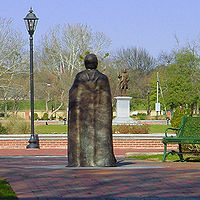
Hephzibah, Georgia
Hephzibah is a city in south Richmond County, in the U.S. state of Georgia. It is part of the Augusta – Richmond County Metropolitan Statistical Area. The population was 3,880 at the 2000 census....
and Blythe, Georgia
Blythe, Georgia
Blythe is a city in Burke and Richmond Counties in the U.S. state of Georgia. The population was 718 at the 2000 census. It is part of the Augusta, Georgia metropolitan area.-Geography:Blythe is located at ....
decided to remain separate. The consolidation
Consolidated city-county
In United States local government, a consolidated city–county is a city and county that have been merged into one unified jurisdiction. As such it is simultaneously a city, which is a municipal corporation, and a county, which is an administrative division of a state...
took effect January 1, 1996 with the city of Augusta surrendering its city charter, and merging operations with Richmond County.
1996 to present
The Augusta Museum of History highlights Augusta's history and famous natives and Historic Augusta has helped preserve architecturally important sites throughout the city. Plans for redeveloping downtown Augusta include new hotels and condos next to Riverwalk Augusta.See also
- List of mayors of Augusta, Georgia
- Arts and culture in Augusta, GeorgiaArts and culture in Augusta, GeorgiaThe culture of Augusta, Georgia is influenced by the many different perspectives and histories of its community members, as well as its own history. The large African American population of the area as well as the city's rural surroundings have affected the types of festivals and culture produced...
- Province of GeorgiaProvince of GeorgiaThe Province of Georgia was one of the Southern colonies in British America. It was the last of the thirteen original colonies established by Great Britain in what later became the United States...
(colonial Georgia) - :Category:History of Augusta, Georgia
External links
- Augusta Chronicle: Augusta's History Series of news articles from 1995 on Augusta history
- Augusta Museum of History
- The Augusta Richmond County Historical Society
- Saint Paul's Church
- Picturing Augusta: Historic Postcards from the Collection of the East Central Georgia Regional Library System Turn-of-the-twentieth-century postcards of the Augusta area from the collection of the East Central Georgia Regional Library System
- Robert E. Williams Photographic Collection: African-Americans in the Augusta, Ga. Vicinity (Richmond Co.), circa 1872-1898. Late-nineteenth-century photographs of Augusta-area African American people, places, agriculture, family life, and more from the collections of the Hargrett Rare Book and Manuscript Library
- Augusta, Georgia, a National Park Service Discover Our Shared Heritage Travel Itinerary
- The History of Jim Crow: Teacher Resources
- Lucy Craft Laney Museum
- Augusta Metro Courier weekly newspaper targeted toward local African American community
News articles
- Augusta Chronicle: Augusta's Black History Various articles about African American history in Augusta
- Augusta Chronicle: Death of jail inmate fueled fire for riots 2000 article about the May 1970 Augusta riots
- Augusta Chronicle: Brown eased crowd during riots 2006 article about James Brown's role in trying to calm 1970 city riots
- Augusta Chronicle: Race Relations 2004-2005 series of articles on local race relations
- Metro Spirit: "chronicle.hate.com" 2007 article about racial attacks on the Augusta Chronicle message board, includes quotes from African American figures in local government
- Metro Spirit: Color of Law 2007 article on lack of more local African American attorneys
- WRDW: Future of the Augusta Focus article about the future of the Augusta Focus newspaper

